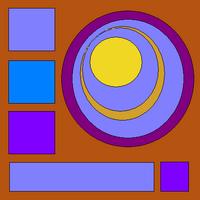Try
My mom's favorite thing to do was nap. She spent a large part of my childhood napping. Napping on the couch, napping in bed. Napping during the day, napping during the night. It's important to note that for her, napping during the night was different than actually sleeping. She typically read romance novels and biographies from her spot on the couch until the wee hours of morning and then would lie down and take a nap until noise from our morning routines woke her up.
When she slept on her side on the couch, her body and the couch together became a fort which I climbed and explored. These were the days before I was old enough for school and before anyone in my town had heard of preschool. She was very big and I was very small. She made the perfect climbing structure--soft, warm, strong and able to catch me if I fell. So when a triangle formed in the space behind her bent legs and knees that made for the most perfectly warm napping place for me, I circled and kneaded it like a cat until I found just the right position.
I also particularly liked playing with her giant lifeless hand that was always dangling off the edge of the cushion. I would take her big pink hand with both of mine and try to make her fingers close into a fist, but I could never manage to get all her fingers closed at the same time. I was mystefied by how her hand would change shape when I pushed it back and forth. If I turned it palm up, the fingers would curl and her hand was round like a cup, but if I turned it over the other way, her hand was long and flat like a paper.
She wanted to take a nap every day and insisted that I take a nap, too. Evidently, small children are supposed to take naps, but I never ever wanted to. We'd climb the stairs to Mom & Dad's room and she'd climb into bed and fall right into a snoring nap. I however, would kick the sheet up over my head with my feet and make a fort. Forts are a big deal when you're little. Mom would interrupt her snoring to tell me to be still, but it never worked.
To occupy me she would suggest we do backs or play hair. As all girls know, doing backs means tickling each other's backs. But I would get bored so Mom would make it a learning activity. I would draw something on her back with my finger and she would have to guess what it was--a flower, a boat, a house, a letter. I took this game very seriously and was always disappointed when she couldn't guess what I'd drawn. I hadn't caught on yet that she was desperately trying to fall asleep and keep me quiet at the same time. Eventually she would suggest playing hair. She would play with my hair for all of a minute, then roll over so I could play with her hair. But I was something like three and had the attention span of gnat, so again she'd have to vary the game now and then to keep me interested.
"Braid it."
"But I don't know how to braid hair."
"Try," she'd say, nearly slipping off into sleep.
I figured if she thought I could actually braid, then I should actually be able to braid. When I couldn't quite make her hair stay in a braid, but succeeded only in making messy knots, I was sorely disappointed in myself and was sure I was letting her down, too. I didn't realize that having a toddler gently play with your hair was akin to having an angel in your room and basking in its bright warm light.
"Mommy, I can't," I'd say in a little fit.
"It's okay, Baby. Just try."



